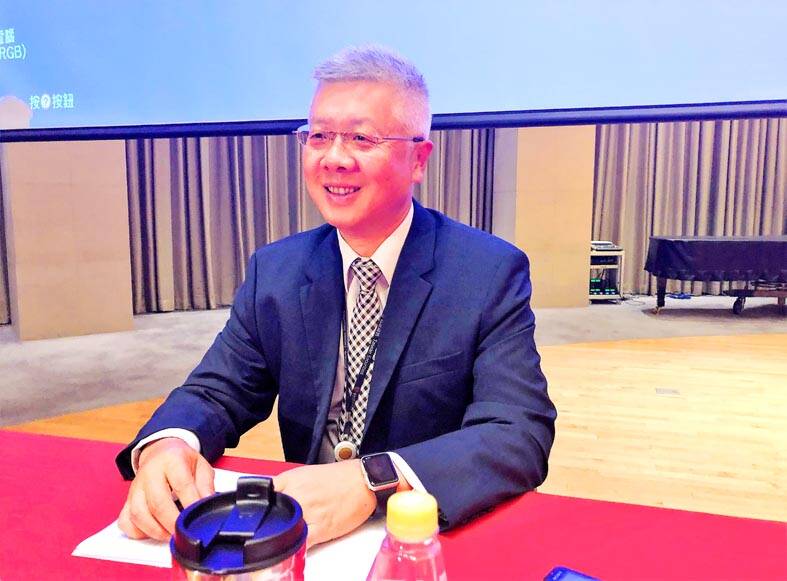Taishin Financial Holding Co (台新金控) yesterday said it would not need to raise fresh capital as it has abundant cash from selling Chang Hwa Bank (CHB, 彰化銀行) shares.
The solvency ratio of its insurance unit remains adequate despite interest rate hikes by global central banks, it said.
“We just raised about NT$19 billion [US$590.6 million] in cash after selling 1 billion shares of Chang Hwa Bank in August and plan to use the money for mergers and acquisitions, or to strengthen the working capital of our subsidiaries,” Taishin Financial president Welch Lin (林維俊) told a virtual investors’ conference.

Photo: Kelson Wang, Taipei Times
The company still holds about 510 million CHB shares and can sell them if needed, he added.
While several local life insurers require capital injections from their parent companies as their equity-to-asset ratios fell below the 3 percent minimum amid plummeting bond investments, Taishin Life Insurance Co (台新人壽) does not have such issues, Lin said.
“We use the accounting method of amortized cost for all of our bonds investments. Therefore, our investment value is not affected by rate hikes at all,” Lin said, adding that Taishin Life’s equity-to-asset ratio as of the end of June was 7.08 percent and its risk-based ratio was about 400 percent.
Taiwanese life insurers are allowed to use different accounting methods — amortized cost, fair value through comprehensive income (FVOCI), and fair value through profit and loss (FVTPL).
Those using FVOCI or FVTPL are vulnerable to plunging bond prices when the market rate goes up.
In the first nine months of this year, Taishin Financial saw its net profit fall 53.6 percent to NT$9.48 billion, or earnings per share of NT$0.58, it said.
The retreat in profit reflected reductions in the handling fees and wealth management income of Taishin International Bank (台新銀行), as well as a plunge in the net profit of Taishin Securities Co (台新證券) in light of tumbling equities in Taiwan, the company said.
The bank’s net interest margin — a closely-watched gauge of banks' profitability — rose to 1.26 percent at the end of last month, thanks to interest rate hikes by the central bank, it said.
Lin said he expects Taishin Financial to distribute cash dividends next year as he is positive about the company’s profit growth this quarter.

MULTIFACETED: A task force has analyzed possible scenarios and created responses to assist domestic industries in dealing with US tariffs, the economics minister said The Executive Yuan is tomorrow to announce countermeasures to US President Donald Trump’s planned reciprocal tariffs, although the details of the plan would not be made public until Monday next week, Minister of Economic Affairs J.W. Kuo (郭智輝) said yesterday. The Cabinet established an economic and trade task force in November last year to deal with US trade and tariff related issues, Kuo told reporters outside the legislature in Taipei. The task force has been analyzing and evaluating all kinds of scenarios to identify suitable responses and determine how best to assist domestic industries in managing the effects of Trump’s tariffs, he

TIGHT-LIPPED: UMC said it had no merger plans at the moment, after Nikkei Asia reported that the firm and GlobalFoundries were considering restarting merger talks United Microelectronics Corp (UMC, 聯電), the world’s No. 4 contract chipmaker, yesterday launched a new US$5 billion 12-inch chip factory in Singapore as part of its latest effort to diversify its manufacturing footprint amid growing geopolitical risks. The new factory, adjacent to UMC’s existing Singapore fab in the Pasir Res Wafer Fab Park, is scheduled to enter volume production next year, utilizing mature 22-nanometer and 28-nanometer process technologies, UMC said in a statement. The company plans to invest US$5 billion during the first phase of the new fab, which would have an installed capacity of 30,000 12-inch wafers per month, it said. The

Taiwan’s official purchasing managers’ index (PMI) last month rose 0.2 percentage points to 54.2, in a second consecutive month of expansion, thanks to front-loading demand intended to avoid potential US tariff hikes, the Chung-Hua Institution for Economic Research (CIER, 中華經濟研究院) said yesterday. While short-term demand appeared robust, uncertainties rose due to US President Donald Trump’s unpredictable trade policy, CIER president Lien Hsien-ming (連賢明) told a news conference in Taipei. Taiwan’s economy this year would be characterized by high-level fluctuations and the volatility would be wilder than most expect, Lien said Demand for electronics, particularly semiconductors, continues to benefit from US technology giants’ effort

‘SWASTICAR’: Tesla CEO Elon Musk’s close association with Donald Trump has prompted opponents to brand him a ‘Nazi’ and resulted in a dramatic drop in sales Demonstrators descended on Tesla Inc dealerships across the US, and in Europe and Canada on Saturday to protest company chief Elon Musk, who has amassed extraordinary power as a top adviser to US President Donald Trump. Waving signs with messages such as “Musk is stealing our money” and “Reclaim our country,” the protests largely took place peacefully following fiery episodes of vandalism on Tesla vehicles, dealerships and other facilities in recent weeks that US officials have denounced as terrorism. Hundreds rallied on Saturday outside the Tesla dealership in Manhattan. Some blasted Musk, the world’s richest man, while others demanded the shuttering of his